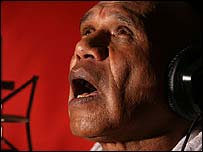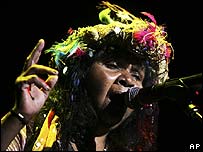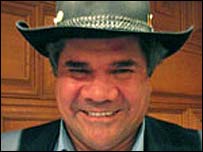Australian Prime Minister Kevin Rudd has delivered a historic apology to Aborigines for past assimilation policies which saw thousands of children forcibly taken from their families.
BBC World Service's The World Today programme got the thoughts of members of the Aboriginal community, some of whom had been members of the Stolen Generations.
ARCHIE ROACH

Much of Archie Roach's music has dealt with the Stolen Generations
|
Archie Roach is one of Australia's best known musicians. He was taken from his family at the age of three.
 I do remember a few things. They came in cars, with police.
I do remember a few things. They came in cars, with police.
I remember a lot of children, a lot of sobbing, but really quietly.
At about 11 years of age, I was coming back with one of my friends after he'd visited our place - there were no other Aboriginal children around - and he looked at me and said, 'Archie, how come your parents are white?'.
This was very confusing for me. I asked him what he meant. He said, 'Well, they're white like me. And you're black'. I couldn't see - I didn't understand this black-white thing.
I'm looking forward to the apology.
It's not just for me - although my mum and dad aren't here, it's for them; although a lot of my uncles and aunties aren't here and some of my cousins, it's for them.
When one was taken, it affected everybody.

RUBY HUNTER

Ruby Hunter has been married to Archie Roach since the 1980s
|
A Ngarrindjeri Aboriginal, Ruby Hunter is Archie Roach's partner. She formed the group The Altogethers with him in 1992. She was eight years old when she was taken.
 They told my grandmother that they were going to be taking us to the circus.
They told my grandmother that they were going to be taking us to the circus.
The day they came, they came with balloons, some lollies and a brown parcel. At first we said we didn't want to go to the circus - I didn't even know what a circus was anyway.
I remember a black car pulling up, and a lady and a man came out the door. It was the first time I had seen a car - it was a like a big monster, and the door was like a mouth. We jumped in this big monster. We were crying.
We never ended up in a circus - we ended up in a police station. I remember the bars.
From there, another car picked us up and drove us. We never got back to our grandmother.
When I first met my foster people, the lady took me to their house and said, 'This will be your house, and the people in this house you can call mum, dad, auntie or uncle'.
I remember that lady, her name was Mrs Angus. They were lovely people. It was on my 13th birthday was that my sister was allowed to come and see me.
She said, 'Happy birthday sister. They didn't let you come to dad's funeral.'
I said, 'What are you talking about - my dad's at work'. I thought she was talking about my foster dad. She said, 'Not that dad, the other dad'.
It takes a gentleman and a scholar to apologise for the things that have unfolded through the history of Australia.
But it would be a relief of something that has been so overburdening on the shoulders for such a long time.
It would make a good clear pathway for the history of this country, for our children not to have to wait for an apology further down the line, letting it go on and go on into the next generation.
We don't want our great-grandchildren to carry on with these issues. That's the most important thing.

MICK DODSON

Professor Mick Dodson is a member of the Yawuru peoples
|
Professor Mick Dodson is director of the National Centre for Indigenous Studies at the Australian National University, and was one of the key authors of the 1997 "Bringing Them Home" report on the Stolen Generations.
 It's a moment of enormous importance to Australia - not only for members of the Stolen Generations but also, I would suggest, for all Australians.
It's a moment of enormous importance to Australia - not only for members of the Stolen Generations but also, I would suggest, for all Australians.
It's been a long time in coming, and I think it will please not only many Aboriginal people who were the victims of these past laws and policies and the forcibly removed children, but also for the country.
I think it's an enormous moment for us.
The Bringing Them Home report was given to government over 10 years ago. The previous government prevaricated a bit, and the previous prime minister had a view about it that I think is behind us now.
When we did the inquiry into the forced removal of indigenous kids from their communities, we talked about reparations rather than compensation. Compensation was part of reparation, but it also included things like an apology, and ensuring that these practices did not reoccur.
Compensation and an apology are not interdependent, but I would hope that eventually the government will have a change of heart from its present position on compensation.
Denying compensation isn't really a decent way out - it's far too negative a way to respond to these people whose pain and suffering is very well known.
I regard the apology as the corner piece of a jigsaw puzzle - it's the rock to build the future, to move into dealing with a whole range of issues that beset Aboriginal Australia.
Kevin Rudd, the new prime minister, has taken such a personal interest in bridging the gap between life expectancy of indigenous Australians and the rest of the country - we indigenous Australians have a life expectancy 17 years less.
Just to illustrate, I'll be 58 this year - that's the life expectancy of an Aboriginal male. It's an unacceptable situation.
But I would expect that this apology will make most fair-minded Australians very proud that their country has the maturity and the strength and political will to do this.
Even if it just makes us feel good, it's the right thing to do, it's the proper thing to do, it's the decent thing to do, and it ought to ennoble all of us.

RICHARD GREEN
Richard Green, who works at Kelby's cafe in Sydney's Inner West area, is a Darug man and language speaker.
 We all come under the one umbrella of Stolen Generation, but all Aboriginal people come under the one umbrella from colonisation, from the displacement.
We all come under the one umbrella of Stolen Generation, but all Aboriginal people come under the one umbrella from colonisation, from the displacement.
We're still affected by it.
Every day we cry for our old people; we're singing for our old people. Our culture is eternal, and it's felt throughout the nation.
The apology will make a difference through pride, through being able to hold your shoulders a little bit more square, and walk with an understanding that we've been apologised to.
But how long has it taken, you know?

RUBY NEIL
Sydney-based Ruby Neil's father was a member of the Stolen Generation.
 As a descendant of a Stolen Generation member, I feel the apology is very overdue.
As a descendant of a Stolen Generation member, I feel the apology is very overdue.
 |
 It's wonderful that the apology is happening. Is it going to stay?
It's wonderful that the apology is happening. Is it going to stay?

|
It [the taking of children] did happen - I've heard people say it didn't - and because of the policy happening it affected all of us, and it's still going on.
We need the apology so we can move forward.
I love the idea that the government are talking about an apology, but I'm so afraid from the past apologies.
Is there going to be another government that comes in and says, 'Ah well, that government of that day said sorry, and we take it back'?
It's wonderful that it's happening. Is it going to stay?

ADAM HILL
Adam Hill traces his heritage to the Dianggati, from Burnt Bridge in the Northern Beaches area of Sydney.
 The main thing that I see as the most positive is the opportunity for mainstream Australia to become educated and informed.
The main thing that I see as the most positive is the opportunity for mainstream Australia to become educated and informed.
It can dispel the ignorance that is horribly prevalent in mainstream society on what it is to be an indigenous Australian, and what it is like having to have lived with what has affected our elders, who exist with us today.
The apologies after this apology will hopefully mean that there is a greater focus on education, and to bringing mainstream Australia up to speed with the facts and the history that predate any other culture that exists in this continent today.



~RS~q~RS~~RS~z~RS~18~RS~)
Bookmark with:
What are these?